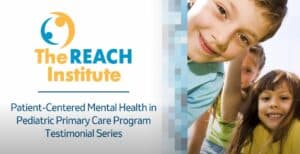Treating pediatric trauma
- September 20, 2022
- The REACH Institute
- Cognitive behavioral therapy, Trauma

“The biggest predictor of having something bad happen to you is having had something bad happen to you in the past,” said Brooks Keeshin, MD. Dr. Keeshin, a child abuse pediatrician and child psychiatrist at the University of Utah, co-developed the new REACH Institute course Addressing Trauma in Pediatric Primary Care.
At least 66% of children experience at least one traumatic event by the time they are 16, according to the US Substance Abuse and Mental Health Services Administration. The National Child Traumatic Stress Network defines a traumatic event as “a frightening, dangerous, or violent event that poses a threat to a child’s life or bodily integrity.”
As Dr. Keeshin pointed out in an earlier blog on screening for trauma, many of the children who have experienced traumatic events are just fine! Or they may have a mild reaction that they can handle with a little help from their family or primary care provider (PCP).
PCPs can use the Child Traumatic Stress Care Process Model developed by Dr. Keeshin’s team and its Pediatric Traumatic Stress Screening Tool to determine how much support to offer a patient who has experienced trauma.
“There are a number of evidence-based therapies for children suffering from traumatic stress,” said Dr. Keeshin. “The one that has the most evidence and is most widely available is trauma-focused cognitive behavioral therapy, or TF-CBT.”
Trauma-focused cognitive behavioral therapy
Like most evidence-based trauma therapies, TF-CBT works with both the cognitive and the emotional aspects of traumatic stress. With the help of a specially trained therapist, patients can learn how their current thoughts about past traumatic events are not helping them. Then the therapist can help them transition to healthier thoughts about both their trauma and subsequent events. At the same time, the therapist can help the patient attend to ongoing emotional reactions to the trauma and trauma reminders.
The central approach used by TF-CBT therapists to address cognitive and emotional responses is the trauma narrative. The trauma narrative is a carefully constructed activity patients do with their therapist to describe what they experienced, what they felt about it, and how they reacted. In doing so, they can experience the stress the traumatic event caused in a safe environment. With the therapist’s help, they can learn to calm themselves and cope with the stress in a healthy, developmentally appropriate way.
A third dimension critical to the effectiveness of TF-CBT is actively engaging the family. From the onset of treatment, caregivers are apprised of the steps in therapy, the techniques being used, and the purpose of the trauma narrative.
“A key aspect of the trauma narrative work is for the child to share their narrative with the parent—to transfer care of the child from the therapist back where it belongs, with the family,” said Dr. Keeshin. First, the therapist must prepare the caregivers to receive the child’s narrative. The child needs the caregivers to be strong, empathetic, and supportive rather than surprised or distressed—so the therapist works with them to make that reaction possible.
The final step of TF-CBT, which typically is a short-term intervention of 16 to 24 weeks, is “graduation.” The child’s trauma narrative includes not only what happened and how they felt about it but how they are coping and what they would share with others in similar situations—that is, setting the patient up to move forward.
“The point of TF-CBT,” said Dr. Brooks, “is to re-establish a normal trajectory.” Because experiences of trauma can lead to more experiences of trauma, one goal of treatment is to prevent further exposure to trauma.
Dr. Brooks emphasized that trauma patients often need evidence-based trauma-focused therapies like TF-CBT, not just any talk therapy. If you are not familiar with therapists in your area who deliver TF-CBT, there is a web-based tool you can use to search for a TF-CBT professional. If there are no TF-CBT or similarly trained professionals in your area, advocating for professionals to be trained in TF-CBT is a good next step. For some patients, you might explore opportunities for tele-TF-CBT.
Medication?
“Most children who suffer from traumatic stress don’t need medication,” said Dr. Keeshin.
He noted that patients with traumatic stress may well test positive on a screener for depression, anxiety, or ADHD. “It’s understandable that someone who keeps reliving a traumatic event like being in a car crash or seeing Dad hit Mom would have trouble concentrating or would feel that the world is not a safe place.”
The trauma-informed response is to treat the traumatic stress rather than assume that symptoms indicate disorders such as ADHD. Dr. Keeshin urges PCPs to wait for a good dose of TF-CBT, with concurrent improvement in symptoms, before prescribing for conditions that may have been caused by, or whose symptoms overlap with, traumatic stress. “If you administer the same screener for depression or ADHD after TF-CBT, the results are likely to be within normal ranges,” said Dr. Keeshin.
According to the trauma care process model, medications are indicated only for pre-existing depression, anxiety, or ADHD—that is, when these conditions predate the traumatic experience. Another role for medication is to help in the short term with trauma-induced sleep problems.
“Medications should be an adjunct to TF-CBT, not the main treatment modality,” said Dr. Keeshin. The reason? “TF-CBT works!”
RESOURCES
Learn to diagnose and treat traumatic stress in children and teens in our October 14 workshop Addressing Trauma in Pediatric Primary Care.
PCPs can use the Child Traumatic Stress Care Process Model, developed by Dr. Keeshin’s team, to assess and treat traumatic stress in children and teens.
The National Child Traumatic Stress Network offers a host of resources for both professionals and families.
The national certification program for trauma-focused cognitive behavioral therapists offers a search tool called Find a TF-CBT Certified Therapist.
Categories
- ADHD
- Anti-racism
- Anxiety
- Assessment & screening
- Autism
- Child mental health
- Coding
- Cognitive behavioral therapy
- College transition
- Culturally responsive
- Depression
- Eating disorders
- Foster care
- Grief
- High-risk children & youth
- LGBTQIA
- Medication
- Parents
- Patient communication
- Pediatric primary care
- School refusal
- Sleep disorders
- Suicide
- Trauma
- Show All Categories
Register for courses
“The REACH Institute Video Testimonial: Jasmin  ”
”
